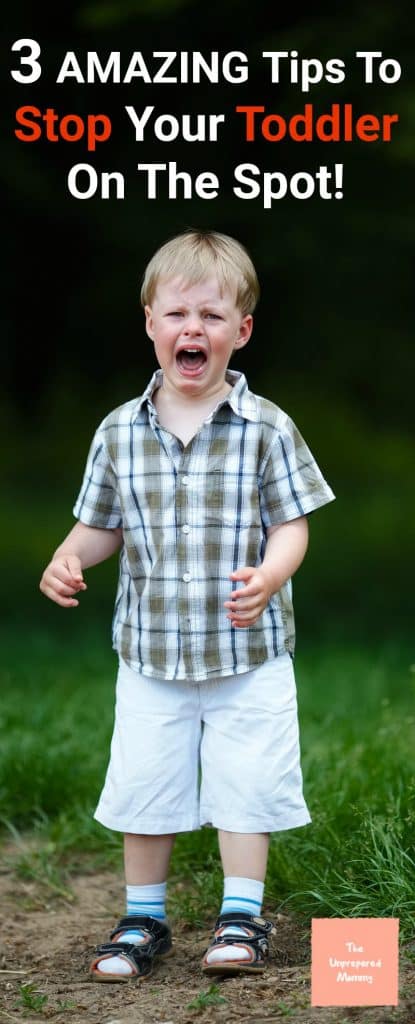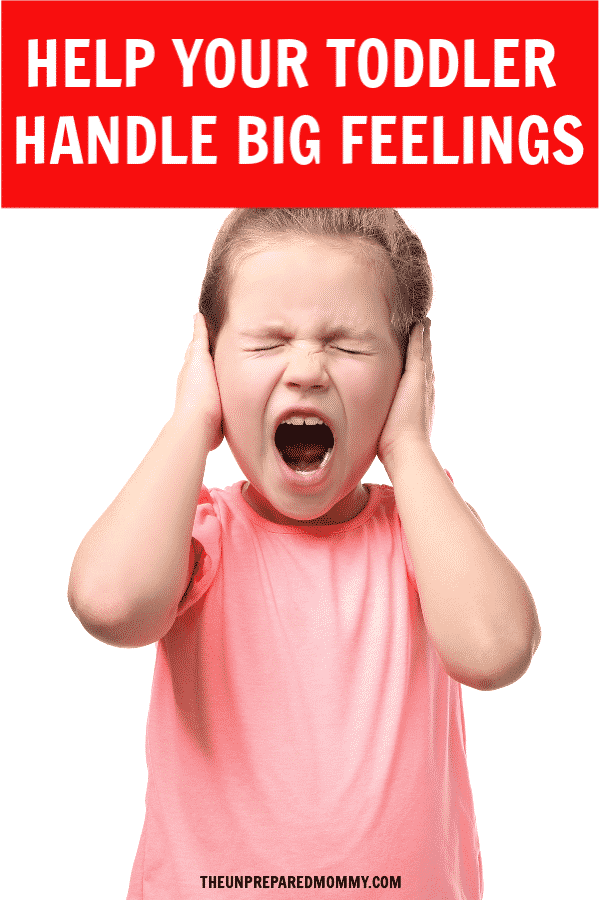A toddler’s “big feelings” can be overwhelming for parents, but they can be overwhelming for the toddler, too. Helping your toddlers handle big feelings can go a long way toward his emotional growth.

Tips to Help Toddlers Handle Big Feelings
As babies become toddlers, they begin to assert their own independence to ultimately make themselves happy. However, they don’t have the emotional development to think beyond their happiness and use logic, yet. Meaning, when they drop a toy in the car and can’t reach it, you get an angry toddler. Telling them to “wait until it’s safe for me to get it for you” can feel like “I don’t want you to be happy” because their emotions are in the forefront and logic isn’t processed as well as it would be for an adult.
Asking them “what’s wrong?” is a difficult question to answer when they don’t understand what they are feeling. This can definitely add to their frustration. By naming the emotion for them, you are teaching them what they are experiencing so they can eventually verbalize it. In addition, naming their emotion can help tame the emotion somewhat because now they know what to call it.
Having these negative feelings is not “wrong”, they just need to grow their emotional skills on expressing and processing them. You can validate the feelings without promoting their response to them. “You are very frustrated right now because I cannot get you the toy, that’s okay.” Then you can redirect their behavior through constructive venting to show them how to get those feelings out.
One way to help them vent is to draw how they are feeling. Get out a piece of paper and some crayons and draw a sad face. Ask them if that is how they feel and if they would add something else to the drawing. When they can picture and articulate their feelings, they have a better sense of control. You are also continuing to validate their feelings.
Another way to build their emotional skills is to work with their imagination. This morning my son was upset because we had run out of granola bars and wanted nothing to do with his banana. I couldn’t make them appear out of thin air, but I said “I wish I could make this box full of granola bars for you! What flavor would you make them?” He stopped crying and smiled while saying “Ummm, banana!” He immediately forgot he was upset that there weren’t any left and decided he actually wanted his banana.
Related book: How to Talk so Little Kids Will Listen: A Survival Guide to Life with Children Ages 2-7
For some toddlers, having a routine can go a long way toward helping them feel secure and therefore less at the mercy of their feelings. Having a routine to rely on allows them to process all the new things they are learning in a familiar setting. This consistency in their day provides them with a way to learn what your expectations are and can lead to less resistance to your rules.
Emotional development in toddlers is an ongoing process. The number of connections their brains make daily is enough to make your own head spin. They aren’t equipped to take your feelings into consideration yet while they are attempting to process their own. Telling them you are going to be late for work if they don’t get dressed doesn’t mean a thing when they are searching for a missing toy.
By understanding how toddler’s think, you can start to work with them, on their level, to promote more cooperation and have fewer meltdowns. Naming their emotions helps reduce their overwhelm in the situation, but you also have to match their intensity. Saying, “you must be angry” in a calm voice doesn’t portray anger. Getting as loud as them shows you understand their problem.
Related product: Teaching Emotions Toolkit
Having them work out their feelings through naming it, writing it down or drawing it can help them cope with “big feelings.” And finally, create a fantasy situation that allows them to think of their situation in another light. Thinking about banana-flavored granola bars was far better than being upset that there were no more granola bars. Once they are more familiar with their emotions and how to self-regulate them, the less likely they are to let them spin out of control.


Related posts:

Emgard says
Thanx that will help alot.